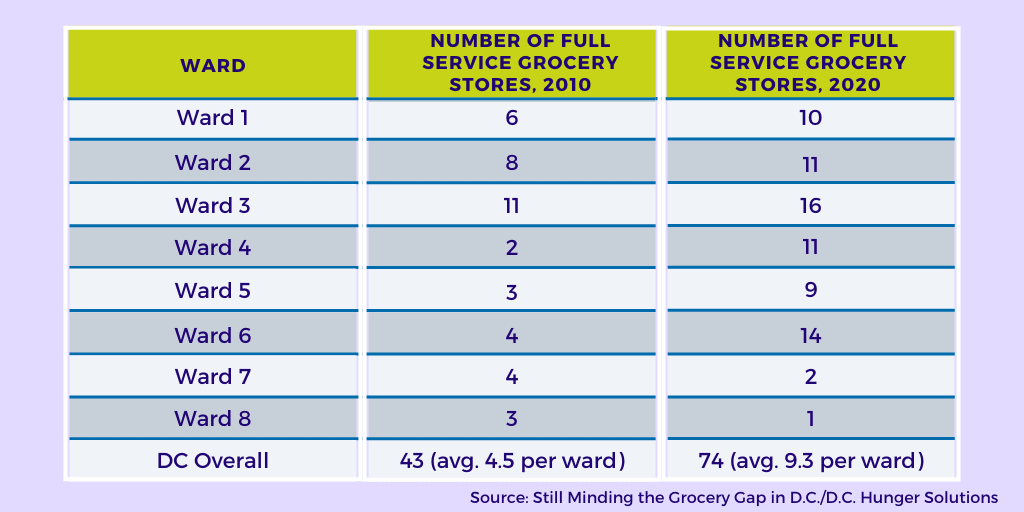Severe Lack of Grocery Stores in Wards 5, 7 and 8, Underscores Racial, Health and Food Access Disparities in the Nation’s Capital
Media Contact:
Jordan Baker
JBaker@frac.org
202-640-1118
WASHINGTON, December 9, 2020 — A severe, and growing, lack of full-service grocery stores in Wards 7 and 8 is one of the contributing factors for food insecurity, according to Still Minding the Grocery Gap in D.C. 10th Anniversary Grocery Store report, released today by D.C. Hunger Solutions. The report finds the disparity in access to healthy and affordable food has taken a toll on the health and well-being of residents and the economy of these wards while shining a light on racial wealth inequity in the District.
“The COVID-19 emergency has highlighted significant disparities among wards when it comes to grocery store access, health, and wealth,” said Beverley Wheeler, director, DCHS. “Adequate grocery store access will decrease the likelihood of diet-related diseases among low-income ward residents, making them less likely to suffer from negative health effects from COVID-19.”
The lack of access to full-service grocery stores in Wards 7 and 8 hasn’t changed much since D.C. Hunger Solutions first issued its grocery cap report a decade ago. In fact, the district’s grocery gap has widened since then despite rapid economic development, with wards with the lowest incomes losing two stores between 2010-2020. In contrast, the report finds wards with the highest income, in northwest and northeast D.C., saw an increase in full-service grocery stores from 2010 – 2020.
D.C. Wards ended this decade with the remaining number of full-service grocery stores:

The report found Wards 7 and 8 had significantly worse health outcomes than other wards, with a high percentage of the population suffering from diet-related diseases and self-reported poor health.
Nearly 15 percent of households in the District of Columbia report struggling to buy enough food for themselves and their families. Many of these residents rely on federal nutrition programs like the Supplemental Nutrition Assistance Program (SNAP) and the Special Supplemental Nutrition Program for Women, Infants, and Children (WIC) to purchase nutritious foods to feed themselves and their families. However, limited access to full-service grocery stores only exacerbates food insecurity.
The report also found the racial wealth gap is increasing in the District of Columbia. Wards 5, 7, and 8 are the only wards in D.C. with Black-majority populations, that also happen to have the highest percentage of unemployment, lowest median incomes, smallest growth in income, and highest rates of poverty. Wards with the highest White populations, wards 1, 2, and 3, have the highest median incomes and have seen the largest economic growth.
“D.C. lawmakers recognize this disparity. We just need them to act quickly to eliminate the growing grocery gap in our nation’s capital and offset the new hunger levels created by COVID-19 and the systemic inequalities,” added Wheeler. “Ending hunger in the District of Columbia is going to require collective action from all sectors. We’re looking for consistent food access, not novelty food access.”
D.C. Hunger Solutions recommends:
- Repealing the FEED-ACT and reinvest the money from ending the tax cut into community-based approaches;
- Investing in the DMV Good Food Fund to sustain and stabilize mission-aligned good food enterprises in the Washington Metropolitan Area;
- Convening a multi-sector task force that examines grocery store development in those wards;
- Investing more in public transportation infrastructure in wards 7 and 8, supporting other sources of food access; and
- Generating community input in the development of new programs.
As the District looks at ways to improve the health and economic outcomes that have been exacerbated during the pandemic, leaders can utilize these strategies to help bring equitable full-service grocery store access across all eight wards.
Download the full report.
###
D.C. Hunger Solutions, an initiative of the Food Research & Action Center, works to end hunger in the nation’s capital and improve the nutrition, health, economic security, and well-being of low-income District residents.
